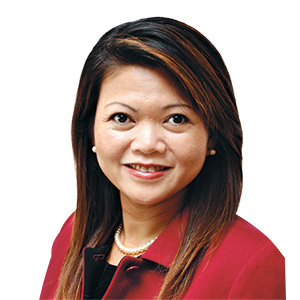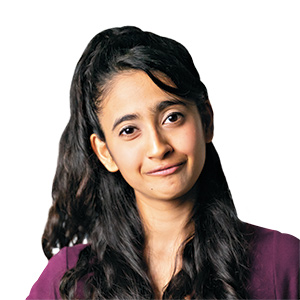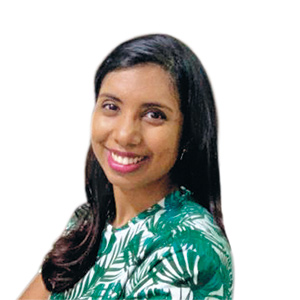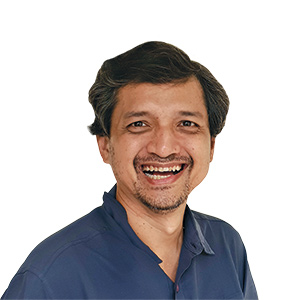Covid 19: Facing Up To New Realities
Five members of our alumni meet — virtually — to share their views and thoughts on the new realities of a world under siege by a pandemic.
A Global Reset
Beyond the fatalities and human suffering, the COVID-19 pandemic may change the very ways we live, work and interact with others. In this group interview — conducted via social conferencing app Zoom — alumni share how this great disruption has affected them, and their hopes for the society that re-emerges from it.
OUR PANEL

Ms Jocelyn Chng
(Arts and Social Sciences ’89)
Managing Director, Sin Hwa Dee Foodstuff; CEO, JR Group

Ms Shanice Stanislaus
(Yale-NUS ’17)
Founder and Director, Creatives Inspirit

Ms Joey Erh
(Arts and Social Sciences ’17)
Master’s Student, London School of Economics

Dr Lasitha Wickramasinghe
(Medicine ’11)
Resident Physician, HCA Hospice Care

Mr Johann Annuar
(Engineering ’02),
Executive Director, Engineering Good
How have you been personally impacted by the COVID-19 situation?
Jocelyn Chng: The Circuit Breaker period has been the busiest time of my life! Our company Sin Hwa Dee started a central kitchen in 2001 to produce ready-to-cook, ready-to-eat meals. Since the start of the Circuit Breaker, many people have contacted us to provide meals for healthcare workers and the foreign workers
in the dormitories. During the Hari Raya weekend, we produced 10,000 meals just for foreign workers. That said, this has been a very tough time for the F&B industry. I have seen a lot of my industry friends closing their companies. Many of our tenants also wound up their businesses and declared bankruptcy during
this period. While we have been busy, our business has been negatively impacted too. With the global lockdown, I couldn’t even ship my products to fulfil overseas orders from China and the Philippines. Everything was stuck in the warehouse and the orders were subsequently cancelled. In China, where we are building two central kitchens, everything has come to a standstill. Yet this is not a time for hibernation
— we are constantly trying to find new solutions to problems, and also ways to retain our few hundred staff.
Shanice Stanislaus: I am an independent performing artist running a social enterprise that brings dance, theatre and different performance arts to underserved communities — such as those stricken by poverty,
or physical and mental illness. I was working in Paris and was supposed to be there for a few months. However, due to the pandemic, I came back to Singapore and have been pretty much living in my room since 16 March — my Stay Home Notice (SHN) ended just a couple of days before the Circuit Breaker measures were implemented. I realise there is no way of going back to my original work plans — all our filming and performance jobs have either been cancelled or postponed. The gig industry is badly hit, and
I have had to retrench the entire company, which was really hard to do. I did what I could to write letters
for them to get funding as arts freelancers, but for myself, I feel as if I have just graduated and am starting all over again. My parents — who have their own company in the education and training sector – have
also had their business badly hit. So they went into the essential services sector to help out with logistics.
I hardly see them now as they are very busy – we are all trying to make ends meet.
Joey Erh: I was pursuing my master’s at the London School of Economics (LSE) — it is something I had wanted to do after working in the government sector for a few years, as it would be beneficial to my career progression. When COVID-19 hit the UK, most of us in school thought it wouldn’t be so bad and I thought I could just self-isolate and stay on in London. But within days, things changed dramatically — schools and libraries were shut, and Singapore’s Ministry of Foreign Affairs called for all students to come home. This has resulted in the disruption of my studies — from exams to classes, everything is now conducted at our own pace. It is not quite the same as learning in a school setting, but we will just have to see what happens.
Lasitha Wickramasinghe: As a doctor in a voluntary welfare organisation, I would visit my patients at their homes prior to the Circuit Breaker. When DORSCON Orange was announced, we were totally taken out of our comfort zone — we didn’t even have enough Personal Protective Equipment (PPE) initially! It took a lot of flexibility and innovation to arrive at the new work arrangement we have now, which involves using digital platforms a lot more to communicate between staff and with our patients. But there are many limitations —
it is not like we can give someone a hug virtually. I also miss the small things that I never knew were so precious, such as being able to sit down for a meal at a coffeeshop! Thankfully, my family and I are doing relatively well. My parents in Sri Lanka are hunkering down and my younger sister is in New York completing her studies.
Johann Annuar: Engineering Good was founded in 2014 as a non-profit organisation that empowers disadvantaged communities through humanitarian engineering. When Home-Based Learning (HBL) started, I realised my kids — who are 8 and 11 years old respectively — are lucky because they have a hoarder
dad who can fix laptops! But that wouldn’t be the case for everyone. We spoke to the Central Singapore Community Development Council, which requested for a donation of 24 laptops. I thought I would be done in two days, but within 10 days, our cause drew more than 100 volunteers, and the donation of 600 laptops. To date, we have collected over 3,000 laptops and given out more than 1,800 units. The pandemic has highlighted the disadvantages faced by the lower-income families and the digital divide in Singapore. Yes,
it is a ‘rich country problem’, but digital inclusion is very important to ensure that everybody has access to online resources, and has a laptop to work or study on.
Do you all observe certain groups being impacted more severely than others?
The pandemic has highlighted the disadvantages faced by the lower-income families and the digital divide in Singapore. Digital inclusion is very important to ensure that everybody has access to online resources, and has a laptop to work or study on.
Mr Johann Annuar
Lasitha: We started offering telemedicine and it has worked quite well. However, not all the elderly folks have access to digital devices, so we are looking to get donations of phones and SIM cards for them. Our biggest concerns are those from the low-income bracket whom we work with, as our services are free to anybody — they only pay for medication. For some, having their many children all crammed into small flats during the Circuit Breaker, or even getting daily meals, is a problem. Being isolated has also impacted some of the elderly patients negatively.
Joey: While I have a job waiting for me, some of my friends from LSE have not found a job and are extremely concerned about entering the workforce at this juncture. Among those who have had to defer their studies and graduate next year, some aren’t even sure if they would be able to go back to the UK because certain visa applications require a certificate of completion. Many international students are really not sure how things are going to play out for them.
Jocelyn: Those getting retrenched while in their 50s have it particularly tough. Compared to younger people just coming out to work, they generally have bigger financial commitments and more to lose. I have seen some friends slip into depression from the weight of their worries. This pandemic has also put the spotlight on the plight of migrant workers — especially those who have been abandoned by their former employers and are left helpless in a foreign land. The welfare of our migrant workers is a social issue that we need to take care of in the long term, and I hope this pandemic will make the nation come to this realisation.
Shanice: When I got back to Singapore, I heard that one of my cast mates in France tested positive for COVID-19. The prevalence of the infection really hit home for me at that point. But for a lot of Singaporeans who do not know anyone around them who has had a close brush with the virus, this is just an invisible threat and its severity might be hard to grapple with. Those with underlying psychological disorders — such as depression or anxiety — might not be able to handle this mental shift with regard to how things are going to be; and I feel that offering support for this group of people is something that needs to be addressed.
What are your own strategies for coping with the change?
The local suppliers whom we have been working with over the years have really stepped up to help us during this period, and it has made me realise the importance of these relationships.Ms Jocelyn Chng
Shanice: Artists make things happen from limitations, so I thought: let’s innovate and find new ways to recalibrate and then scale up from there. So I went back to doing dance and Zumba classes, which I do four to five times a week. I also started the Tropical Arts Crisis series, where artists from around the world share their own stories during this period — it is my way of showcasing the solidarity of the creative community, and reminding everybody that they are not alone.
Lasitha: In Sri Lanka, there was a civil war that started before I was born. The older generation has this mentality that, if they leave home and perish in a bomb blast, then so be it. That old mentality has come back during this pandemic. I focus on how I can contribute to the situation, and don’t worry about things beyond my control. I also cut down on my exposure to the media, because they do tend to catastrophise
the situation. I also meditate and find time for personal reflection.
Jocelyn: Having a supportive community is very important. I had so many people send care packs over to encourage me during this period. It touches me greatly and spurs me to go on.
 THE BIG HIT
THE BIG HIT
The COVID-19 outbreak could cost the global economy up to US$2 trillion this year, and is expected to wipe out
6.7% of working hours globally in the second quarter of 2020.
The International Labour Organization also predicted that nearly
25 million jobs would be lost by the end of 2020.
Source: United Nations Conference on Trade and Development, International Labour Oraganization
What are the silver linings of this global pandemic?
Johann: There are other groups collecting old computers for distribution, but from corporations, which is the more efficient way of doing things. When I started collecting donated devices from individuals to close the digital divide, my sneaky goal was to bring Singaporeans together and get everybody to play a part. Sure, there are those who would donate fax machines and even historic laptops with floppy disk drives, but we have had more good people giving us good stuff than bad. The positive response we have seen has far outweighed the number of internet commenters and doomsayers, and I am very happy.
Jocelyn: This global lockdown has been the push my company needed to take our business online — now, every single brand under our company is available online. It has also brought about a shift in our mindset
in terms of business operations. This pandemic has reminded us that, even as a business goes global, it should still stay local. Where we have been sourcing raw materials overseas, we are now looking at buying local. It might be a bit more costly but at least I have certainty of supply. In fact, the local suppliers whom we have been working with over the years have really stepped up to help us during this period, and it has made me realise the importance of these relationships. This pandemic has also given many the opportunity to spend more time with their family. Now I get to have meals with my kids who are in their twenties whereas previously they would always be out with friends. I hope we can all keep some of the good habits post-pandemic.
Johann: I hope everybody can use this as a cultural mindset shift and start embracing a new way of living. Yes, gatherings are never going to be the same without sharing prata and kopi, but we have to accept the new normal. It will be interesting to see the new powers of the global economy when they emerge, and realise how much of the “needs” in our lives were artificially created — such as degrees or even jobs. This is a chance for everybody to sit down and reset.
Shanice: Now that I have more time to think and really create, rather than just go from one gig to another,
I can reflect and deep dive into my true purpose as an artist, and also the meaningful interactions that I want to have. That said, I do want to go back to the old ways! It has been an insightful and reflective period but I really crave a concert or a stage show. I hope that we will move forward, thoughtfully.
What do you think is a key quality a young person should have, in order to thrive in this new world order?
Joey: Adaptability would be key. To be able to accept the situation and see how you can move forward from there – and know that more obstacles will pop up in the future.
Jocelyn: Adaptability is very important. Some of my industry friends are fixed in their ways and insist that they cannot do anything else. But I cannot think that way, as I also have to think about our staff. If I can’t do business overseas in a lockdown, then I will look for local opportunities. I also teach this to my children. My eldest is graduating this year and he and a lot of his peers are unable to find jobs. I tell him he is lucky for this to be happening while he is young and can afford to take a few punches. I also told him to change his mentality: don’t just think about getting a dream job, or one with a good pay package. Accept whatever is available and get the most out of it as a learning experience.
Shanice: Resilience has always been an important quality. When my cohort graduated, it seemed that nobody wanted to hire us, so I just had to figure out how to create my own work. Now, I will just have to find out how to approach the new obstacles presented by the pandemic. Many Singaporeans are unwilling to take risks and might be fearful, but you have to get thrown into a situation to learn resilience — it is a very embodied experience.
Lasitha: We have been experiencing a lot of changes in the way we work — and discovering that there are ways to work more efficiently. Innovation has been important during this period, and will remain so, moving forward.
Text by Koh Yuen Lin. Photos by Wilson Pang